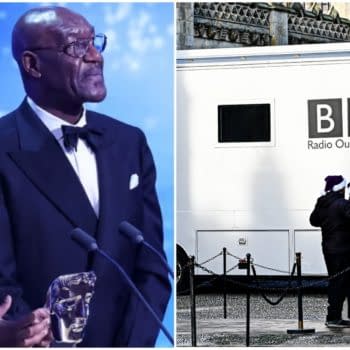Posted in: Movies, Recent Updates | Tagged: entertainment, film, financing, indy filmmaking, selling films
Film Schooling: Insider Insights On Indy Filmmaking – Selling Your Film And Negotiating
By Chris Hood
(This is Part Twenty Five of an ongoing series to help educate aspiring filmmakers on the process of making their first film. Previous articles in this series can be found at BleedingCool.com and MovieIndustry.com)
Parts: 1, 2, 3, 4, 5, 6, 7, 8, 9, 10, 11, 12, 13, 14, 15, 16, 17, 18, 19, 20, 21, 22, 23, 24, 25
With a lot of hard work, a little luck and the benefit of the bountiful knowledge I've bestowed on you over these last several months, at this point you'll have multiple parties interested in handling your film. This is likely the most important part of the process when viewed against whether or not your movie will actually make back money for the investor(s). It all comes down to the decisions you make here. You need to negotiate the best possible deal and be certain the contracted terms represent the best possible interests of the project.
Whether or not you make this best possible deal, or how close you come to it, will be dependent on factors that, in part, can't be learned from books or articles on the subject. I've tried to give as many of the necessary tools as possible in this series, but the last, big element of which I can contribute nothing at all, is your ability to negotiate well. Either you have it or your don't. There are people who are great negotiators and know it. I hope you have one of those at this point in the process. There are people who suck at negotiating and know it. That's a respectable level of self awareness as that person will, smartly, recluse himself from getting involved in negotiations at all. The biggest danger is the person that thinks he's good at negotiating, but actually isn't. Most people seem to fall into this category, so be warned.
Hear this now – the first offer you get from a distributor/sales agent is almost never their best offer. That should go without saying, common sense and all that. Aside from being involved in film, I'm partners in a very successful internet company that buys and sells domain names. We own several thousand URLs and I'm the guy who generally steps in when handling the bigger deals. Having negotiated millions of dollars in domain sales on top of all the movie deals I've put together over the years, the best piece of advice I can give is to never be afraid of losing the deal. I realize that's easier said than done, so at the very least, you need to represent to the other party that you're not afraid of losing the deal. Good negotiators can smell fear on the other guy. They can often tell when the other person is bullshitting. They can sense when they're hitting the other side's threshold.
I'll share one story with you about a film I made, but unfortunately I can't tell you which one as the final deal included a non-disclosure agreement. I had been shopping Movie X for several months. Offers had been rolling in, but nothing noteworthy. Most offered very little in the way of an advance or guarantee, if any. I had a couple $5k offers and one $10k offer – discouraging considering what we spent on the film. I was continuing to approach other companies, but had gotten to the point where I was reaching out to smaller and smaller companies that were even less likely to pony up any advance, let alone one greater than the $10k that was on the table.
I was nearing the point when I was going to go back and revisit the $10k offer. That particular offer started at $5k and $10k was as far as I could get them to go. It had been six weeks since I spoke to them, so I was hoping that offer would still be available if and when I made that call. Around this same time, I got a call from another party, Company X. They had been one of the first distributors I sent the film to nearly 3 months earlier. I had followed up a couple of times and was at least acknowledged and told it hadn't been look at yet. I'd given up on Company X at this point, so that belated call came as a surprise.
They liked the film, and by that, I mean they felt they could sell it. On that first, introductory call, they told me that they could do $20k on a minimum guarantee. As that was double the next best offer, most people would probably jump at that. I didn't. I can't tell you how I knew there was more money to be had, but I believed there was. I knew of one filmmaker who had dealt with Company X about a year before and gotten a $30k MG (minimum guarantee), though his film had a bigger budget than mine. I decided to play hard. Perhaps part of my mindset was – whether I got a $10k or $20k MG, the film was going to be a financial failure, so I swung for the fences. I intimated that there were other offers that I was fielding (which was true) as well as that the one I was seriously looking at was better than what Company X was offering (which wasn't, technically, true, unless you consider I liked the other company's name "better").
Negotiating on the phone can be tougher than via email in that you have to think fast and respond fast. The minute the $20k offer came out, I responded that I had a better offer. Of course, "better" is a subjective term, but the assumption was that I had an offer that exceeded a $20k MG, which I obviously did not. I'm sure that the fact that I responded so quickly, without pause, made my position far more believable. By the end of that phone call, the offer was at $30k. I pretended I wasn't enthusiastic, though I actually was. I was dismissive and said something along the lines of "I'm afraid that's not going to get it done." We parted ways and agree to talk again in a couple of days. The next offer was $40k. Things were starting to get interesting.
For the first time, I put a number out there. $100k. Ambitious? Absolutely. Unreasonable? Maybe a little, but I relayed my price with confidence as though it was the most reasonable figure in the world. I was first told they couldn't get anywhere near that number. My immediate response was that we probably wouldn't be able to make a deal, but I appreciated their time and interest. Through this part of the process, I believed that I could still go back and get that last offer they had presented if it came to that, though that's not always the case. Legally speaking, once an offer is rejected or a counter-offer made, the offering party is under no obligation to honor their last offer. However, be advised that even if you accept an offer, it's contingent on the agreement of terms which in the film business can be complicated, so even if a company makes an offer, you accept, and they try to renege, it's probably not going to be worth pushing it legally unless you already have all the minutia agreed to in writing as well.
So I left the $100k number dangling out there and the talks went on for two more weeks, back and forth. I negotiated hard and it paid off. We finally agreed at $90,000, 4 ½ times the initial offer. I was pretty happy with myself. Although a relatively small deal compared to some of the domain deals I was used to negotiating, in relation to the project and the budget, I'd hit a home run (or at least triple) when just a few weeks earlier I was resigned to the possibility of a soft single. (I hate sports and have no idea why I'm using a sports analogy here.)
The main point of this story is that for most people, this negotiation would have ended with a $20k MG, perhaps 30k at best. You need to do everything in your power to leave as little money as possible on the table. You can have a great film, an incredible film even, and make a lousy deal. You can have the best film of the year and make the worst deal of the decade. The reverse of that is that you can have a mediocre film and make a great deal…but it comes down to having a good deal maker. Do you? If not, find one and have him handle this part of the game.
NOTE: It's worth mentioning, that at the time of this deal, home video and the DVD market were at their peak. If I were trying to sell the same movie today, I think $10k would probably be about the best I could hope for. Sadly, things have gotten that bad. The paradigm has shifted so considerably that monetizing small films has become incredibly tricky. It used to be that if you could get Blockbuster or Hollywood Video of Family Video to stock a title, you could see a nice six-figure revenue from that one deal. If you (or your distributor) could get your film into all of them, you could be look at a quarter million to half million in gross sales. The game has changed and not for the better. Now, Redbox is the Holy Grail. A good Redbox deal can land close to $100k, but competition is fierce. At its peak, the video store chains might bring in 20 or 30 or 50 new titles in a single week because their 5000+ square foot stores could accommodate that and they had the customer base for that to make sense. By contrast, space in Redbox kiosks are painfully limited, usually to 8-10 new titles a week. Once you allow half (or more) of those slots to big studio and notable indy fare, there's very little room for your small film. Also, Redbox pays less for titles than the video stores used to…because they can. And everyone is vying for that space. Add to the equation that considerably more movies are being made today and the odds of seeing your film in Redbox compared to Blockbuster in it's prime is probably 1 to 50. Daunting, but that's the reality.
At some point in the process, you'll ask (or be offered) an agreement to review. Be aware that if you ask for it, it's sending a signal that, in your mind, you're getting close, so timing of this request in important. Learn to play the game. If they offer to send you the agreement and you read it right away and get back to them the next morning with your thoughts, you'll seem eager. You'll be revealing a bit of your hand. If a week goes by and they ask what you think of the agreement and you "haven't gotten to it, yet," that's sending a signal as well. They may suspect you're posturing, but you may also be fielding other, better offers or are simply not that excited about what you've heard from them so it's not a priority.
Regardless, at some point when you start to get closer, the contract will be the new focus of the discussion. And the contract is a wily beast to be tamed to your wishes, though in most cases, it will end up being an unruly pet with which, at best, you find an acceptable compromise.
The terms of the contract are often drafted in a such a way to screw over the filmmaker and benefit the distributor/sales agent to the fullest. And it's these contracts, and their tricks and traps, that we'll be discussing in the next article.
Chris Hood is a writer, producer and director of such films as "Counterpunch" starring Danny Trejo (a Lionsgate release) and "Dirty Dealing 3D" with Michael Madsen and C. Thomas Howell. He and Jon Schultz own Robin Hood Films, a Las Vegas-based distribution company representing English language films around the world and Chris operates a film blog at MovieIndustry.com. He's also dead sexy. (Mr. Hood denies any involvement in the creation of this mini-bio.)
















